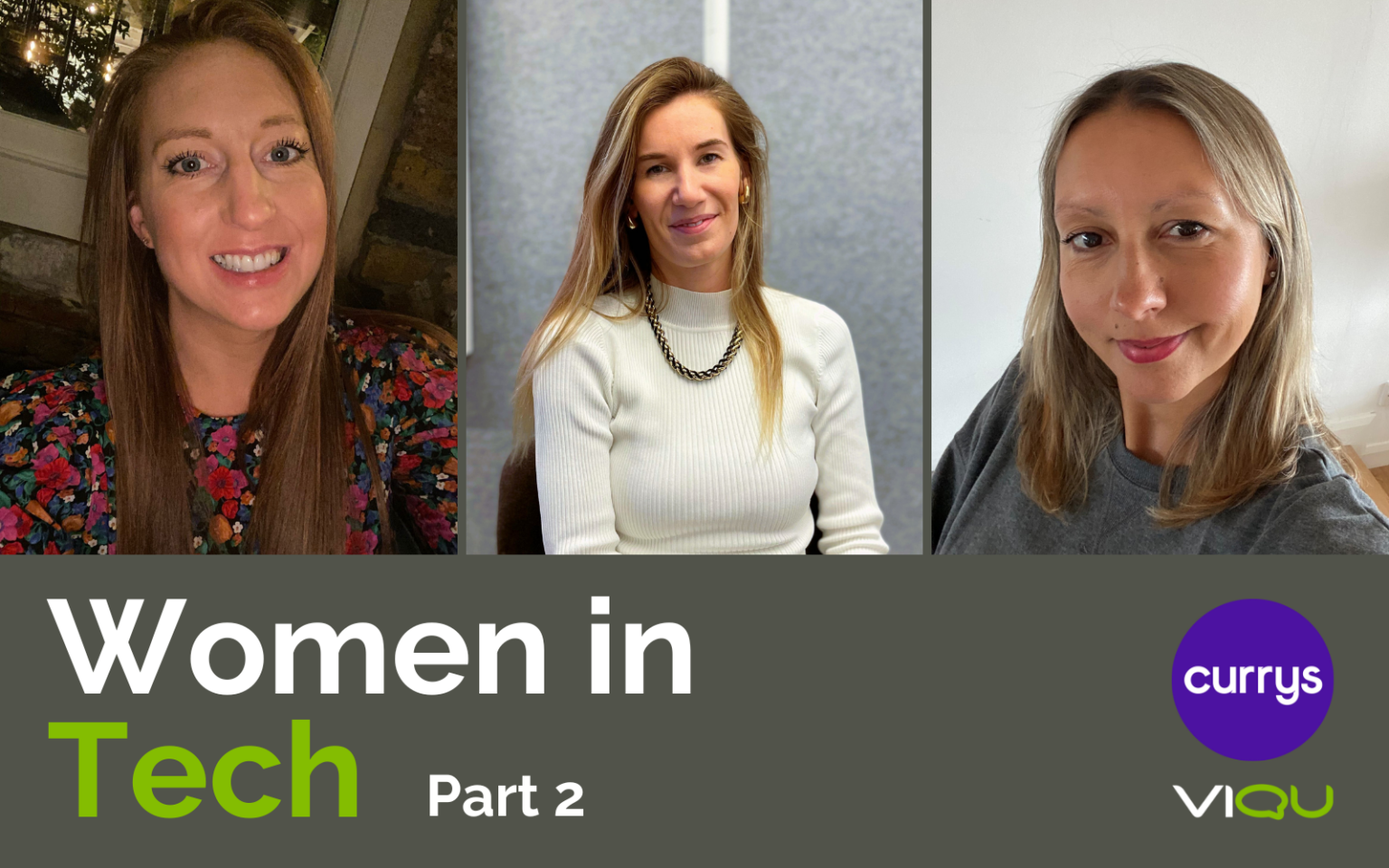Q&A With Currys’ Women In Tech: Part 2

From Left To Right - Philippa Smith, Nia Williams, Diane Spindley
Continuing with this fantastic two-parter interview (click here for part 1), below I ask Philippa, Nia and Diane from Currys about what they believe will encourage more women and young girls from different backgrounds to get into technology, whether they believe their gender has ever impacted their careers, and the advice they would give to people looking to enter the industry.
Do you believe that your gender has ever impacted the way that you’ve been perceived or treated in your career?
Philippa: I think I’m really lucky that I can say no. I’ve always been surrounded by amazing female and male leaders, who have been great allies and role models. My attitude is very much to treat everybody equally. That’s the culture I’ve always looked to be a part of and now encourage at Currys. I want everyone to have the same experience as me.
Nia: Overall, I would agree. Apart from the odd comments here and there, I’ve never been in situations that have negatively impacted me. I’ve had some great male and female directors who have supported me to develop in the direction I want, so my experience has been very positive in the workplace.
Diane: I’d say the same. When I got hired by Merlin, in my first technology-focused role, it was a guy that took a chance on me. He knew I’d never worked in technology before, but he saw something in me and supported my development.
I did find it frustrating the year I got married how people immediately started asking me when I was going to take a career break to have children. It was quite senior men AND women asking. How is that an appropriate question?
I have come across a few people who are set in their ways, but unfortunately, you get that anywhere, not just in technology.
But, on the whole, I’ve had a very positive experience as a woman in technology. I’d say it’s actually the network of people who want to support, promote, and advocate for me that have kept me in technology!
Philippa: And that’s where Diane has done a great job.
I think infrastructure is often perceived as pretty male-dominated. Diane does work with loads of guys, but they’ve welcomed her with open arms and worked really well alongside her because of the skillset, knowledge and personality she has brought to the team.
And I think that’s opened up a more traditionally male-heavy area of the business, which is fantastic.
Do you think your gender has ever worked to your advantage in your career?
Nia: For me, I don’t think it’s been a case of gender. I think it’s been more about people who have taken a chance on me because of my personality, background or that they have seen a similarity in me to them or what they used to be like. It’s not been a ‘because you’re a woman’ sort of thing.
Diane: I think Nia’s right, it’s about how you can relate to people, isn’t it?
But I think your gender can positively play a part in that you might have a slightly different approach to how people normally do things, or you navigate situations differently and that encourages teams to talk and collaborate.
Like Philippa said, that’s the benefit of having diverse teams. You get different points of view, and that can create change.
Our colleague base should reflect our customer base – which is very diverse across gender, race, ethnicity, geography, age – everything! I think our leadership at Currys has been really supportive of creating diverse teams, and now we’re talking more openly about it and actively saying it’s important for us to reflect on.
Philippa: And our boss is doing a great job at that in his team. Five years ago, it was not so diverse. But now we are seeing people being promoted up through the organisation, creating diversity in our leadership team, which is really positive.
Diane: I was the only woman in my team at one point. Now there is a powerhouse of women in the team, it’s about 50:50. And there’s diversity in terms of age, ethnicity etc. too.
Philippa: There are definitely still pockets within the team that aren’t so diverse, but even those areas are slowly moving in the right direction.
What do you think businesses should be doing to encourage girls and young women to consider careers in technology?
Philippa: I think there are two main things. So, I always say ‘top down, bottom up’. Essentially, you need to have the right support, advocacy and mindset at the top who believe it is important. If you don’t, that attitude will cascade down.
So, part of that is policymaking, to ensure the right support is in place. Frankly, whilst it is great to have shared parental, the reality is women are the ones who give birth, so if a business doesn’t have the right processes and policies in place, you’re going to find it hard to attract women.
And then the other thing is how we can encourage people. This might be through early careers, re-entry or upskilling within the business. So, one question for us, is how do we encourage people from other areas of the business, like those working in customer-focused roles in our stores, to consider moving across to technology? We have done it to some degree at Currys, but I think we’ve got a long way to go.
Diane: Linking with what Philippa said, I think it’s about being open-minded. I’ve already said I don’t come from a technology background, nor do I have a technical degree. So, when I’m recruiting, I often will get asked if I have a preference over the ideal candidate’s background. My answer is always no.
I don’t care about where a person has come from, what’s important to me is the person and their transferrable skills. You can learn on the job. I know that because I did it, so I guess I come at it from a slightly different lens.
I think if we focus on soft skills and what someone can learn, they can fly!
Nia: Philippa and Diane have already covered everything very well; I think it’s just important to emphasise that it is absolutely critical to have people at the top living the values the company is trying to encourage and being vocal. Without that, a manager, a HR department or a marketing team can try as much as they can, but they’re never going to get anywhere.
So, do you think a key part of getting more women into tech is about businesses being more open to taking on professionals from different backgrounds and walks of life?
Diane: I think some businesses focus too much on candidates who tick every box in terms of qualifications, sector experience etc. By deprioritising those things, you open up a whole different world of people, especially women who might not think they can apply because they don’t tick every single box.
When I secured my first role in tech, there wasn’t a job spec, I just got asked to interview. Everything hadn’t already been fleshed out, so I had the bandwidth and the opportunity to make the role my own. Maybe if I had seen a set criteria, I would have felt differently about going for the role.
Philippa: We’re probably not the best representation between us, but there are many more different routes than just the traditional university degree path. If I look at our CIO and CTO, they both came from different paths, and they’re two of the smartest people I know.
So, it’s about taking away the bias against people who haven’t followed a traditional path. It’s actually something we’ve been pushing in the last year or so at Currys. We’ve really encouraged people from our stores to apply for our graduate entry scheme.
Nia: I think part of it is about businesses taking on people from different backgrounds – and maybe not necessarily pigeon holing someone because of past experience. You don’t have to have a pure tech background to then go and work in tech. Maybe you are a great PM from a total different industry but with a real interest in technology. You don’t necessarily have to be the perfect fit – you just have to be keen to learn and show great potential.
I think there are other elements to this though that are just as important that Philippa touched upon earlier, like having the right policies and support in place for women in technology companies. Implementing these elements will attract more female talent.
Is there any advice you would give to someone wanting to go into technology?
Nia: I think you need to be comfortable being yourself and knowing the value you can bring.
One of the few negative male comments I have had directed towards me was years ago after a meeting. Bear in mind I’m quite a reserved person. I will speak when I feel like I have something of value to say.
I remember after a meeting, this person took me aside and told me I had to start speaking up, otherwise I wasn’t going to get anywhere in this business. Part of me wants to call him now! But I remember at the time being really bothered by his comment, and thinking I had to be this super outgoing person. I couldn’t do it. It’s not in my nature. But I’ve learnt over time that he was wrong. People will appreciate you for who you are and how you choose to conduct yourself. So don’t be afraid to be yourself.
Philippa: I think I would link to that by saying not to be afraid to give things a go and ask questions. Some of the things I’ve enjoyed most in my career have been the things that I haven’t expected to like.
I remember being asked to pick up a rescue job for this big programme with tech-enabled change involved. I knew nothing about it. It turned out to be a really rewarding experience. I would never have chosen to do it, but it wasn’t actually that scary. It was no different than a non-tech project.
So, ask loads of questions and be curious.
Diane: I would say exactly that. Be curious and be comfortable being uncomfortable. Have that mindset to challenge yourself.
If you’re interested in something, say yes! You’ll learn something. Whether you love it and opportunities come from it, or it turns out it’s not for you, the world of technology will become more open to you.
Thank you for reading this fantastic and insightful interview with Currys’ Philippa, Nia and Diane. If you would like to keep reading our Women in Tech interview series, please click here.
Similar articles you might like...

In The Age Of Artificial Intelligence, Why Are Businesses Prioritising Female Decision-Makers?
It has been found that employing women in AI teams and leadership positions is strategically important for tech businesses as AI grows in popularity.

Q&A With Currys’ Women In Tech – Part 1
In the first half of this two-parter Q&A, Philippa, Nia and Diane from Currys discuss how they got started in IT and developed into their current roles, and the ways Currys is contributing to and facilitating a better gender balance in its tech workforce.
Latest jobs
IT Risk & Controls Lead
 London, United Kingdom
London, United Kingdom
 £55k - 63k per year
£55k - 63k per year
IT Risk & Controls LeadLondon – Hybrid (2 DPM in office)Up to £63,000VIQU have partnered with a leading organisation who are seeking an IT Risk & Controls Lead to join their IT risk management team.The...
Site Supervisor
 Stone, United Kingdom
Stone, United Kingdom
 Market Related
Market Related
Job Title: Site Supervisor Location: Stone (on-site)- must have full UK Driving License. Salary: market- relatedVIQU has partnered with a top engineering company seeking a Site Supervisor to create and manage project plans. The...
Installation Co-Ordinator
 Winchester, United Kingdom
Winchester, United Kingdom
 £250 - 350 per day
£250 - 350 per day
Installation Co-Ordinator – 3-month contract – Hampshire My customer is looking for a proactive and organised Installations Co-Ordinator to manage and support the installation of IT products and services across their trade and supply locations....
Network and Security Specialist
 London, United Kingdom
London, United Kingdom
 Market related
Market related
Network and Security SpecialistLondon – Hybrid (4 days weekly in office)Competitive Salary + Car allowanceVIQU have partnered with a prestigious Fortune 500 company that is looking to hire a Network and Security Specialist. The Network...
Financial Accountant
 Stone, United Kingdom
Stone, United Kingdom
 Market related
Market related
Financial AccountantStone - HybridCompetitive SalaryVIQU have partnered with a leading entity in operational technology and digital transformation. Operating in highly regulated and demanding industrial sectors, they have successfully executed pivotal projects across energy, nuclear, renewables,...

